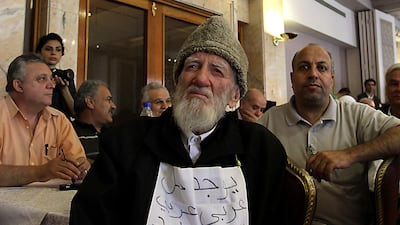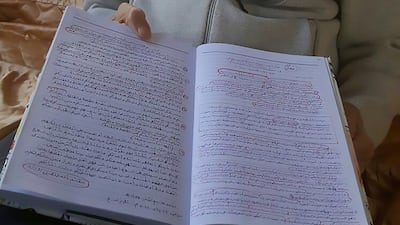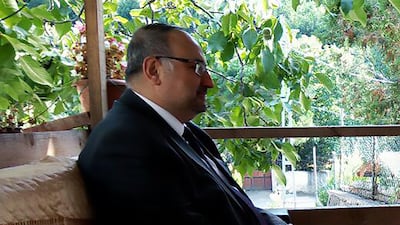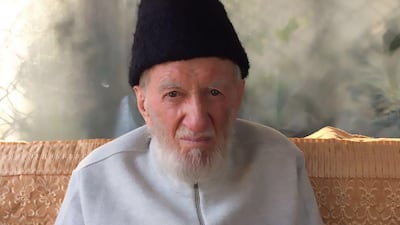Jawdat Said, a Syrian Islamic thinker, author and proponent of non-violence who opposed the fanaticism of some of the Muslim Brotherhood’s ideologues, died in exile in Turkey on Sunday. He was 90.
His death leaves a centrist gap in a fragmented Syria, with the country divided between the Alawite-dominated government, Marxist-Leninist Kurdish militias in the north-east and Al Qaeda-linked groups in the north-west.
Said died from Covid-19, Syrian opposition figure Ahmed Tumeh, a disciple of Said, said by phone from Istanbul.
Mr Tumeh said that as soon as the Syrian revolt against five decades of Assad family rule broke out in March 2011, Said called for peaceful resistance regardless of the brutality many expected from the regime.
“Be forewarned, he told us from day one, do not take up arms,” Mr Tumeh said.
The revolt became an armed struggle by the end of 2011. The government's response to the mostly Sunni protest movement had toughened by then, and Sunni soldiers began to defect from the military, forming the western and Arab-backed Free Syrian Army.
Militant groups, particularly the Al Qaeda-affiliated Nusra Front, came to dominate armed opposition to the government, providing a rationale for Russian intervention on the side of the regime in 2015.
Sheikh Jawdat recognised early on in his life on the need to set weapons aside in favour of the power of ideas, and critically think about our ideological heritage
Syrian opposition figure Ahmed Tumeh
“Sheikh Jawdat recognised early on in his life on the need to set weapons aside in favour of the power of ideas, and critically think about our ideological heritage,” Mr Tumeh said.
“He was convinced that democracy is the best of what humanity has produced, and that it does not contradict with Islam."
Said was fond of telling the biblical story of the brothers Cain and Abel and how Abel declined to use violence even though his brother was bent on killing him.
The Egyptian-educated Said rose to prominence in the 1960s as one of the most vocal scholars to challenge Sayyed Qutb, a radical preacher who advocated an Islamic state by violent means if necessary.
Egyptian president Gamal Abdel Nasser had Qutb hanged in 1966 for a plot against the government. Qutb remains a revered figure for many in the Brotherhood.
Said graduated from the University of Al Azhar in the late 1950s and returned to Syria shortly afterwards as political turmoil shook the country.
By 1963, mostly Alawite officers had seized power. In 1970, Hafez Al Assad wrested control from a fellow officer, ushering in his dynastic rule.
In 1982, government forces killed thousands of people in the central city of Hama, in a crackdown on a revolt led by an armed group within the Brotherhood.
Said's credentials as an anti-Brotherhood figure helped him to survive as an independent figure.
In 2003, the regime jailed a dozen of his pupils in the neglected Damascus suburb of Daraya, after Said organised them to set up a public library and begin cleaning the streets.
After the 2011 revolt, followers of Said established a form of self-rule in Daraya, which was developed in other areas that escaped the control of the regime.
Independent judges presided over the courts and a civilian administration ran the suburbs.
"If the Syrian revolt succeeds through arms we will be ruled by the same [violent system] we have had since Muawiya 1,400 years ago," Said said as the revolt began.
He was referring to the first Umayyad caliph, Muawiya Ibn Abi Sufyan, who ruled by the sword and died from illness in Damascus in 680 AD.
"Democracy does not come into a country unless all the factions agree not to carry arms and resort to the ballot box. This is common sense," Said said.
But even some of Said's most loyal followers took up arms, becoming the core of the rebel force that controlled Daraya until it surrendered to the regime in a Russian supervised deal in 2016.
Batti Gul Meter Chalu
Producers: KRTI Productions, T-Series
Director: Sree Narayan Singh
Cast: Shahid Kapoor, Shraddha Kapoor, Divyenndu Sharma, Yami Gautam
Rating: 2/5
Trump v Khan
2016: Feud begins after Khan criticised Trump’s proposed Muslim travel ban to US
2017: Trump criticises Khan’s ‘no reason to be alarmed’ response to London Bridge terror attacks
2019: Trump calls Khan a “stone cold loser” before first state visit
2019: Trump tweets about “Khan’s Londonistan”, calling him “a national disgrace”
2022: Khan’s office attributes rise in Islamophobic abuse against the major to hostility stoked during Trump’s presidency
July 2025 During a golfing trip to Scotland, Trump calls Khan “a nasty person”
Sept 2025 Trump blames Khan for London’s “stabbings and the dirt and the filth”.
Dec 2025 Trump suggests migrants got Khan elected, calls him a “horrible, vicious, disgusting mayor”
The%20specs%3A%20Taycan%20Turbo%20GT
%3Cp%3E%3Cstrong%3EEngine%3A%20%3C%2Fstrong%3EDual%20synchronous%20electric%20motors%0D%3Cbr%3E%3Cstrong%3EPower%3A%20%3C%2Fstrong%3E1%2C108hp%0D%3Cbr%3E%3Cstrong%3ETorque%3A%20%3C%2Fstrong%3E1%2C340Nm%0D%3Cbr%3E%3Cstrong%3ETransmission%3A%20%3C%2Fstrong%3ESingle-speed%20automatic%20(front%20axle)%3B%20two-speed%20transmission%20(rear%20axle)%0D%3Cbr%3E%3Cstrong%3ETouring%20range%3A%20%3C%2Fstrong%3E488-560km%0D%3Cbr%3E%3Cstrong%3EPrice%3A%20%3C%2Fstrong%3EFrom%20Dh928%2C400%0D%3Cbr%3E%3Cstrong%3EOn%20sale%3A%20%3C%2Fstrong%3EOrders%20open%3C%2Fp%3E%0A
Leaderboard
15 under: Paul Casey (ENG)
-14: Robert MacIntyre (SCO)
-13 Brandon Stone (SA)
-10 Laurie Canter (ENG) , Sergio Garcia (ESP)
-9 Kalle Samooja (FIN)
-8 Thomas Detry (BEL), Justin Harding (SA), Justin Rose (ENG)
Desert Warrior
Starring: Anthony Mackie, Aiysha Hart, Ben Kingsley
Director: Rupert Wyatt
Rating: 3/5
Timeline
2012-2015
The company offers payments/bribes to win key contracts in the Middle East
May 2017
The UK SFO officially opens investigation into Petrofac’s use of agents, corruption, and potential bribery to secure contracts
September 2021
Petrofac pleads guilty to seven counts of failing to prevent bribery under the UK Bribery Act
October 2021
Court fines Petrofac £77 million for bribery. Former executive receives a two-year suspended sentence
December 2024
Petrofac enters into comprehensive restructuring to strengthen the financial position of the group
May 2025
The High Court of England and Wales approves the company’s restructuring plan
July 2025
The Court of Appeal issues a judgment challenging parts of the restructuring plan
August 2025
Petrofac issues a business update to execute the restructuring and confirms it will appeal the Court of Appeal decision
October 2025
Petrofac loses a major TenneT offshore wind contract worth €13 billion. Holding company files for administration in the UK. Petrofac delisted from the London Stock Exchange
November 2025
180 Petrofac employees laid off in the UAE
The biog
Name: Sari Al Zubaidi
Occupation: co-founder of Cafe di Rosati
Age: 42
Marital status: single
Favourite drink: drip coffee V60
Favourite destination: Bali, Indonesia
Favourite book: 100 Years of Solitude
Company%20Profile
%3Cp%3E%3Cstrong%3ECompany%20name%3A%20%3C%2Fstrong%3ENamara%0D%3Cbr%3E%3Cstrong%3EStarted%3A%20%3C%2Fstrong%3EJune%202022%0D%3Cbr%3E%3Cstrong%3EFounder%3A%20%3C%2Fstrong%3EMohammed%20Alnamara%0D%3Cbr%3E%3Cstrong%3EBased%3A%20%3C%2Fstrong%3EDubai%20%0D%3Cbr%3E%3Cstrong%3ESector%3A%20%3C%2Fstrong%3EMicrofinance%0D%3Cbr%3E%3Cstrong%3ECurrent%20number%20of%20staff%3A%20%3C%2Fstrong%3E16%0D%3Cbr%3E%3Cstrong%3EInvestment%20stage%3A%20%3C%2Fstrong%3ESeries%20A%0D%3Cbr%3E%3Cstrong%3EInvestors%3A%20%3C%2Fstrong%3EFamily%20offices%0D%3Cbr%3E%3C%2Fp%3E%0A
Jetour T1 specs
Engine: 2-litre turbocharged
Power: 254hp
Torque: 390Nm
Price: From Dh126,000
Available: Now
Specs
Engine: Dual-motor all-wheel-drive electric
Range: Up to 610km
Power: 905hp
Torque: 985Nm
Price: From Dh439,000
Available: Now
DC%20League%20of%20Super-Pets
%3Cp%3EDirector%3A%20Jared%20Stern%3C%2Fp%3E%0A%3Cp%3EStarring%3A%20Dwayne%20Johnson%2C%20Kevin%20Hart%2C%20John%20Krasinski%2C%20Keanu%20Reeves%2C%20Olivia%20Wilde%2C%20Kate%20McKinnon%2C%20Jameela%20Jamil%3C%2Fp%3E%0A%3Cp%3ERating%3A%203%2F5%3C%2Fp%3E%0A
More on Quran memorisation:
Cryopreservation: A timeline
- Keyhole surgery under general anaesthetic
- Ovarian tissue surgically removed
- Tissue processed in a high-tech facility
- Tissue re-implanted at a time of the patient’s choosing
- Full hormone production regained within 4-6 months
Who's who in Yemen conflict
Houthis: Iran-backed rebels who occupy Sanaa and run unrecognised government
Yemeni government: Exiled government in Aden led by eight-member Presidential Leadership Council
Southern Transitional Council: Faction in Yemeni government that seeks autonomy for the south
Habrish 'rebels': Tribal-backed forces feuding with STC over control of oil in government territory
White hydrogen: Naturally occurring hydrogen
Chromite: Hard, metallic mineral containing iron oxide and chromium oxide
Ultramafic rocks: Dark-coloured rocks rich in magnesium or iron with very low silica content
Ophiolite: A section of the earth’s crust, which is oceanic in nature that has since been uplifted and exposed on land
Olivine: A commonly occurring magnesium iron silicate mineral that derives its name for its olive-green yellow-green colour
BMW M5 specs
Engine: 4.4-litre twin-turbo V-8 petrol enging with additional electric motor
Power: 727hp
Torque: 1,000Nm
Transmission: 8-speed auto
Fuel consumption: 10.6L/100km
On sale: Now
Price: From Dh650,000
Three ways to boost your credit score
Marwan Lutfi says the core fundamentals that drive better payment behaviour and can improve your credit score are:
1. Make sure you make your payments on time;
2. Limit the number of products you borrow on: the more loans and credit cards you have, the more it will affect your credit score;
3. Don't max out all your debts: how much you maximise those credit facilities will have an impact. If you have five credit cards and utilise 90 per cent of that credit, it will negatively affect your score.
Classification of skills
A worker is categorised as skilled by the MOHRE based on nine levels given in the International Standard Classification of Occupations (ISCO) issued by the International Labour Organisation.
A skilled worker would be someone at a professional level (levels 1 – 5) which includes managers, professionals, technicians and associate professionals, clerical support workers, and service and sales workers.
The worker must also have an attested educational certificate higher than secondary or an equivalent certification, and earn a monthly salary of at least Dh4,000.





